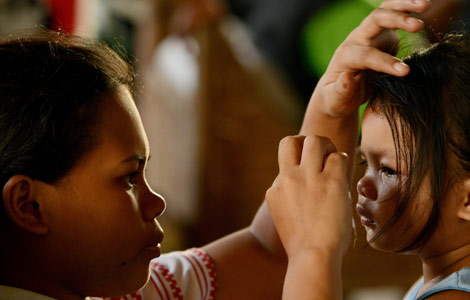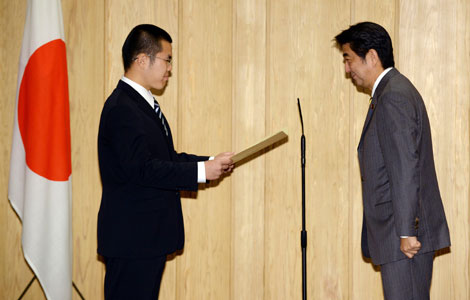

|
Shi Yang Shi pursues the bridge between cultures and ideas. Milo Sciaky / for China Daily |
A chinese actor looks very much the part in his adopted country, Italy
Today Shi Yang Shi looks out of place. The tall, happy extrovert looks as if he would be better placed in the landscape of his childhood, in the valley where the Yellow River flows. But he is in Milan, in the most laidback of locations, the Municipal Gardens. He is a rarity here: a professional Chinese actor working in Italy.
"My mission is to promote dialogue among Italians and Chinese," he says. "I am determined to be a cultural bridge between the two peoples."
A versatile actor of stage and screen, and recently also of television, he triumphed in a cult television program called Le Iene (The Hyenas) last season. It is a comedy-satire that reports on politics and consumer issues.
In the show, disguised as a foreign correspondent working for a Chinese television station, he had to stop Italian politicians outside the Chamber of Deputies in Rome to question them about political matters.
"At first I felt embarrassed," he says. "Confucianism taught us to pay great respect and devotion to authority and hierarchy. Consequently as a Chinese guy I was scared of making fun of Italian politicians. On the other hand, as an Italian citizen it was impossible to turn down the role."
Finally, the results were hilarious and caused no offence.
As he talks, he comes across as very much the native Italian, making ample use of his hands to get his points across.
"Isn't an actor like a chameleon?" he asks by way of explanation.
In his pursuit of cultural bridge-building he specifically hopes to close the gap between Chinese communities in Italy and native Italians. In fact he is at it everyday, particularly through his theater work.
He studied acting in Milan, at the Arsenale Theater, under the guidance of the directors Marina Spreafico and Kuniaki Ida. On stage he made his performing debut in Brecht's Mother Courage.
Later, in 2009, he developed his own theater-research project, creating a performance space called Spazio Compost PPP in a former wool mill in Prato, Tuscany, an old textile town where he has lived for the past four years.
In Prato, about 15 kilometers northwest of Florence, "you cannot help but come to terms with the fact there is a Chinese community", he says. Prato has one of the largest Chinatowns in Europe, and a city council survey estimated that there are more than 20,000 people of Chinese ethnicity there, making it one of the biggest concentrations of Chinese people in Western Europe.
He is discovering his roots in Prato. "Yes, I always feel like someone who has been uprooted, but here ... I have found stability and solidity." His theater genre is "social and popular, not elitist", he says, and his acting method is based on improvisation.
"My storytelling draws upon events taken from the life of everyday reality. Listening to people's different points of view, thus associating words with direct experience, I and four Chinese dancers create plays about what we see and hear on the streets."
They pay special attention to issues vital to both communities. "We work on conflicts set in motion by unresolved situations."
Moreover, Yang is coining a new theatrical language. "It's a kind of grammelot (a theatrical onomatopoeic language used in association with pantomime and mimicry that dates back to the 16th Commedia dell'Arte) but created ad hoc to facilitate comprehension among Chinese and Italians.
There is no good mutual understanding if one is always challenging. Instead we need to be receptive to diversity that brings new ideas, he says.
"Too many people still cling to stereotypes. There are still quite a few Chinese who think that Italians are too lazy, and that they do everything too slowly. On the other hand some intolerant Italians believe that Chinese block communication."
Nevertheless, Yang is optimistic. "I believe that enormous change is happening. I wager on second generations."
Yang was born in Jinan, East China Shandong province, in 1979. "Yes I come from the land of Confucius: that's why I am so tall," he laughs.
A watershed moment came in 1990 when he was 11 and he and his mother, a doctor of traditional Chinese medicine, traveled to Italy. His father joined them later in Milan, where his parents had friends.
His stage name, Shi Yang Shi, originates from his real name.
He chose to add another "Shi", because "when I was a child in my homeland, they used to make fun of me, since Yang Shi translates as "sheep poop". Funnily enough, here in Italy this odd name coincides with my new identity."
He is referring to the custom of Italian actors to say "merda" (sh---) twice backstage before shows, as an auspicious ritual to attract the largest audience. (Its origins lie in the days when people went to the theater or opera in horse-drawn carriages.)
"I found confidence in myself at the age of 14, when I began translating from Mandarin for my father, who wept at my decision to begin my acting career, as if I had sold my soul to devils."
Yang says that in his youth, upset after failing at a renowned drama school in Milan, he fantasized about being a tenor. "I was so disappointed."
He then took time off to consider his future.
"I went back to China and worked as an interpreter for Luciano Pavarotti during his 2001 concert at Shanghai Grand Theater."
Thanks to that experience, Yang realized that there was no career for him in opera.
"First, I don't have the perfect ear, second I have a mellifluous baritone voice," he laughs. Still, he continues to take singing lessons.
Yang endeavors to combine Italian creativity and exquisite taste with his rich Chinese heritage.
"Our great organizational skills, our huge sense of solidarity, the virtue of work and spirit of sacrifice. But in this sense I often feel more Italian, guided by zest for la dolce vita. I live moments of lethargy; I feel as lazy as a sloth."
Among his previous cinema experiences, he has worked as first assistant director in some movies. In Beijing he was assistant director in the short film Foto di Gruppo, on the 2008 Beijing Olympics, and bit parts on screen followed.
His upcoming work includes Il comandante e la Cicogna (The Commander and the Stork) by Silvio Soldini, in which he plays a plumber, and Eva dopo Eva, by a first-time director, Sophie Chiarello, in which he plays a gay make-up artist.
Yang has deep nostalgia for Jinan and its artesian springs.
He will be back there soon, for the 2012 Beijing Design Week, from Sept 28 to Oct 6. During the event, he will put on stage Meet Design Show, by Francesca Molteni, an homage to Italian design.
Yang looks forward to his return to his Chinese home, "where my grandmother lives. Those are my real surroundings".
For China Daily
(China Daily 09/20/2012 page28)







